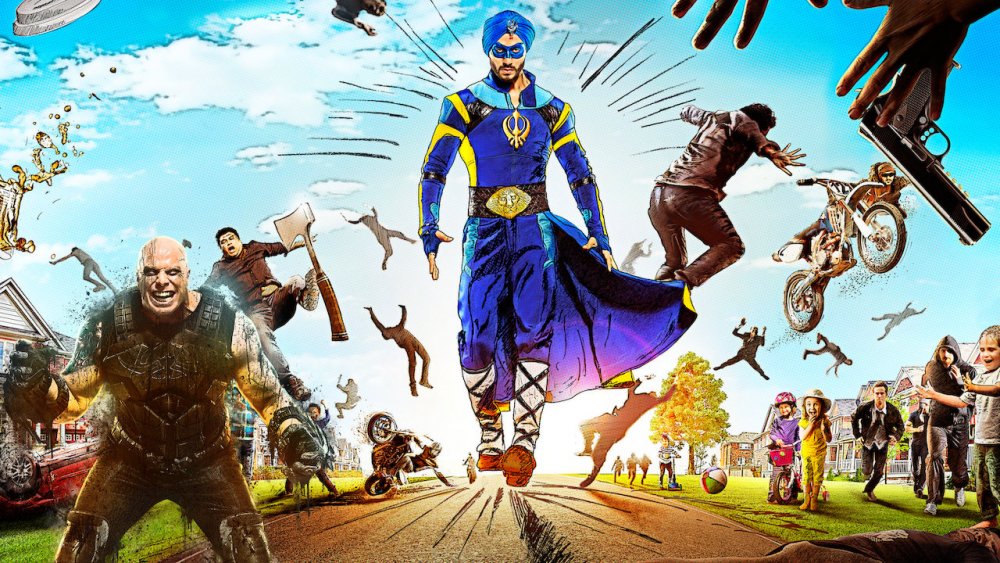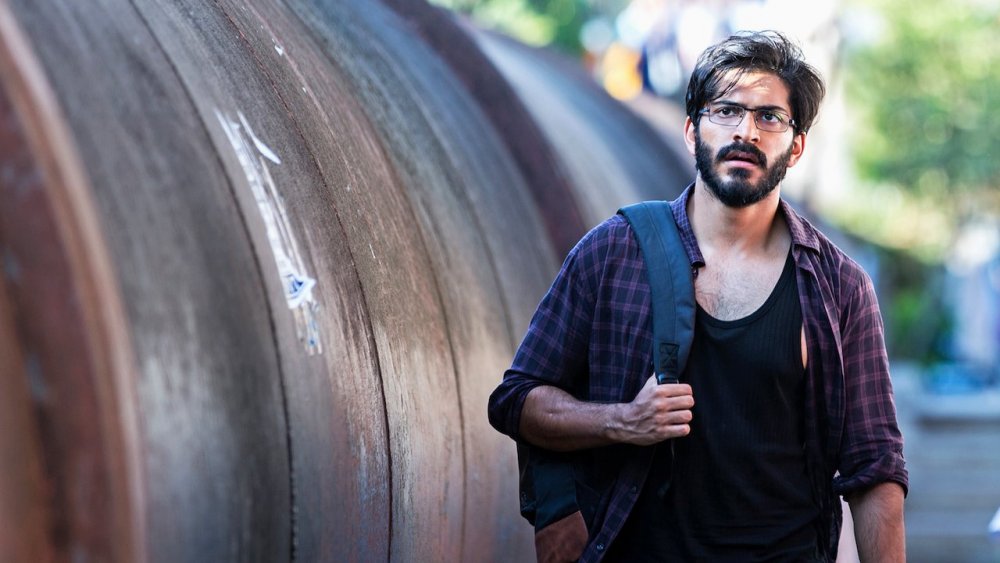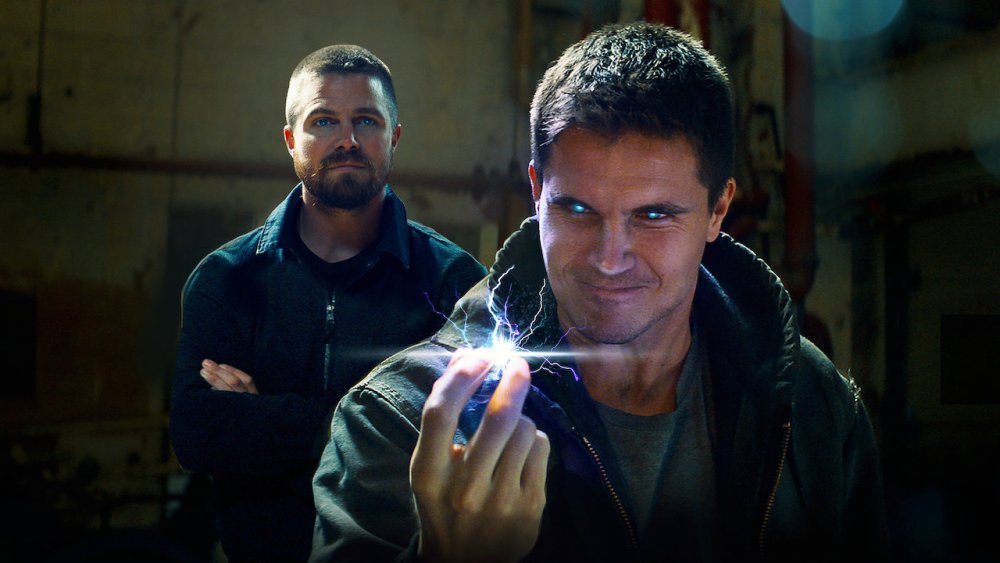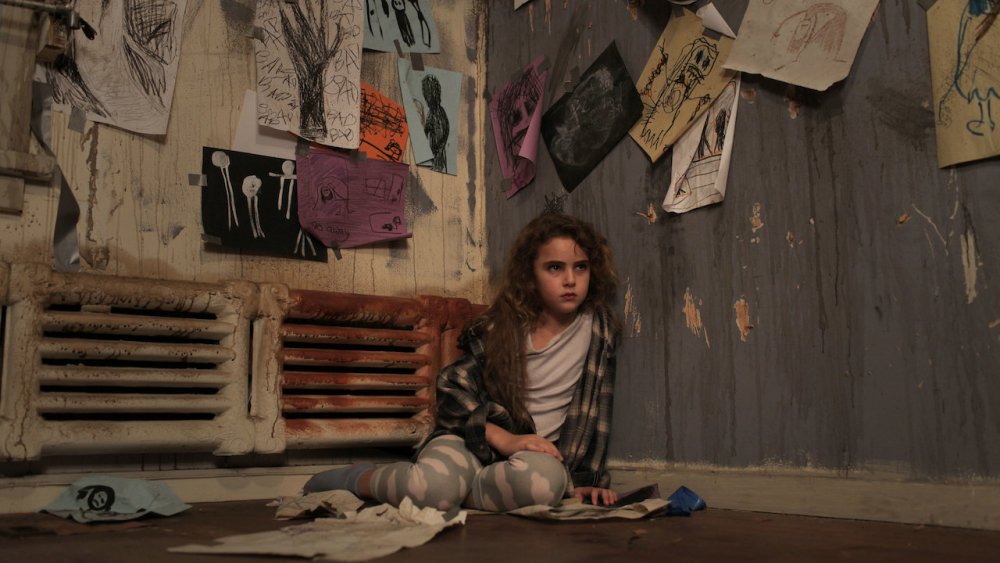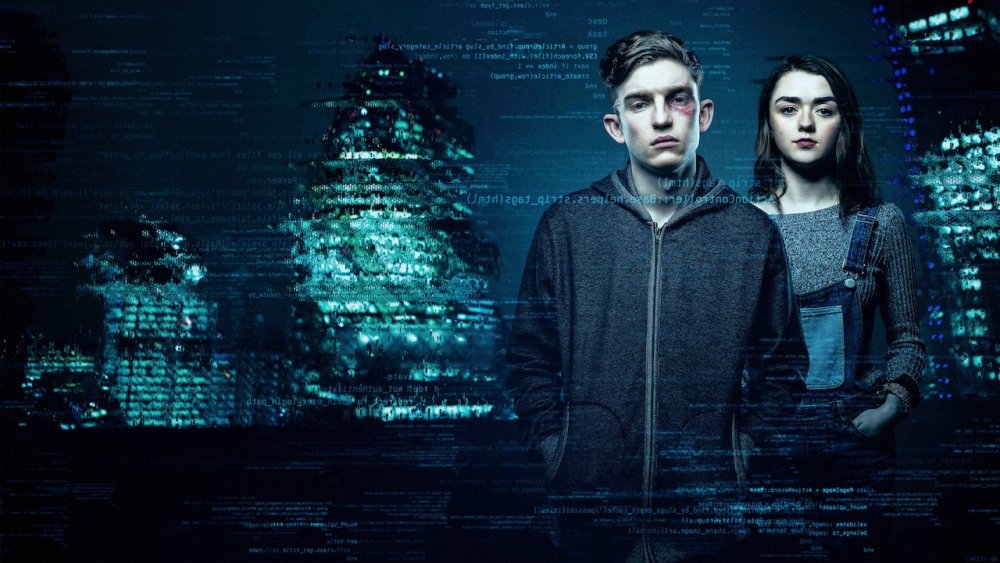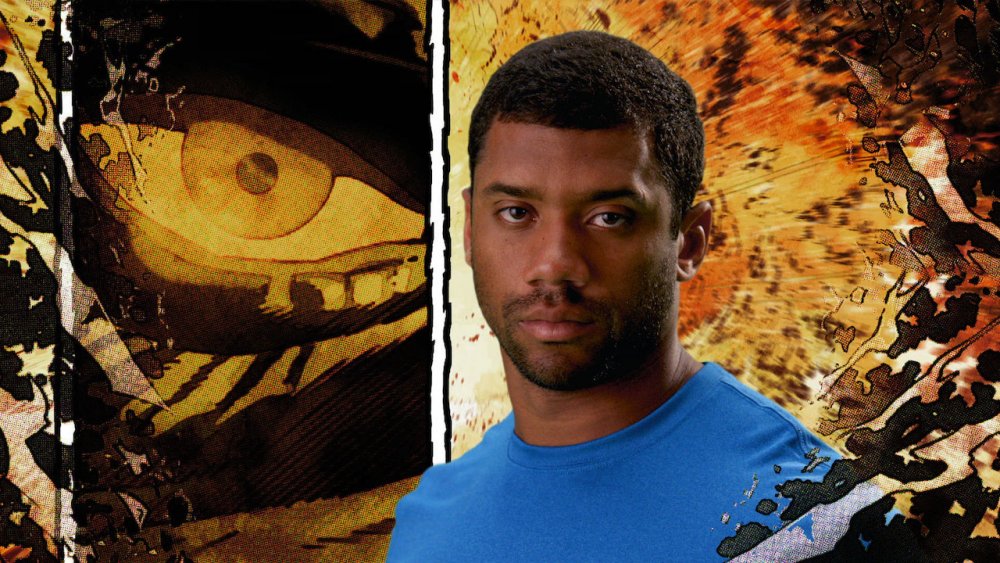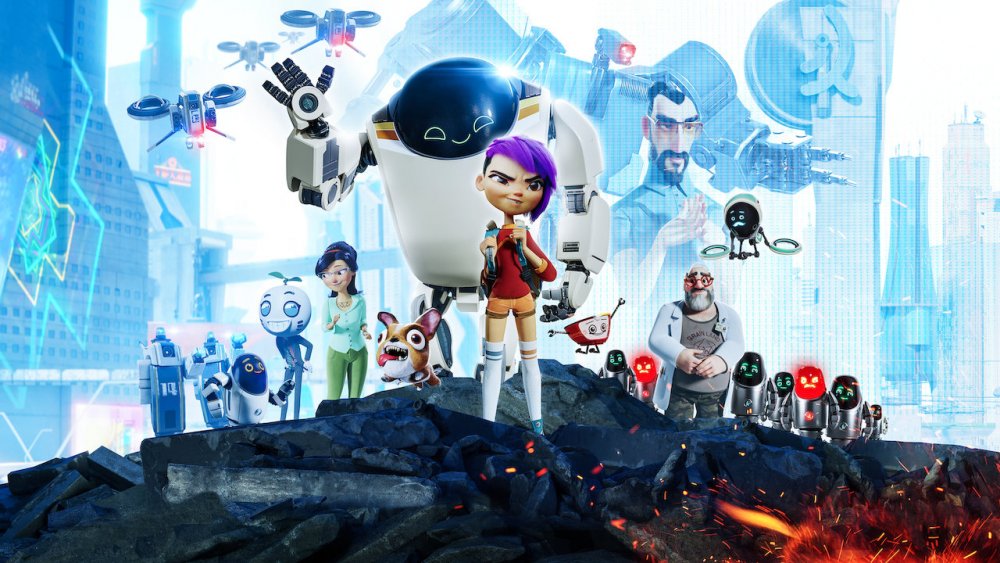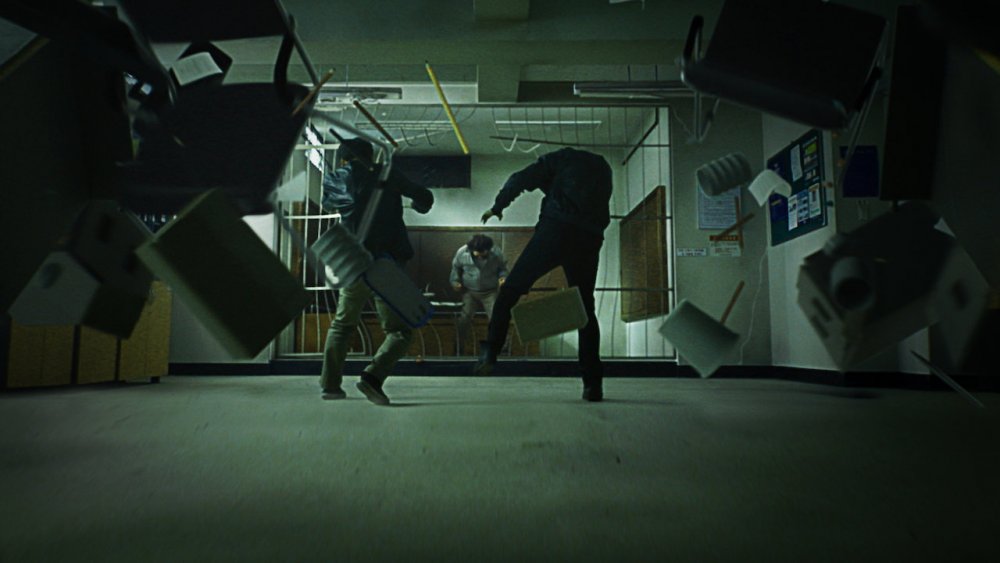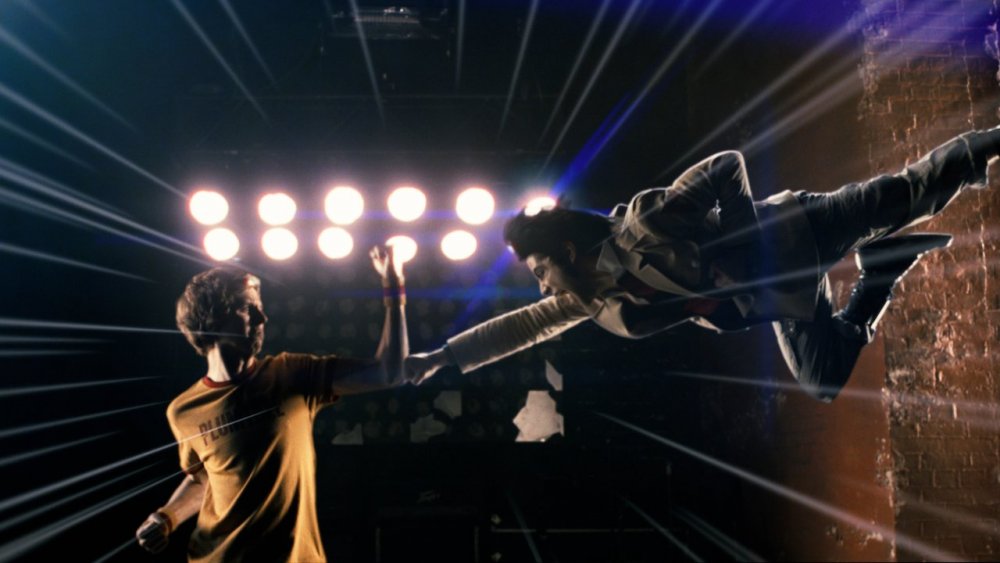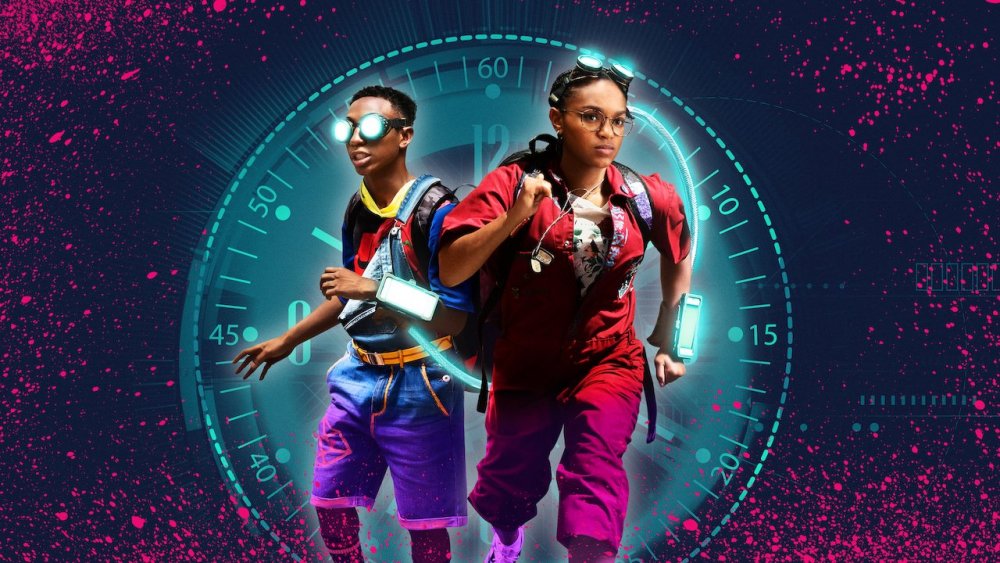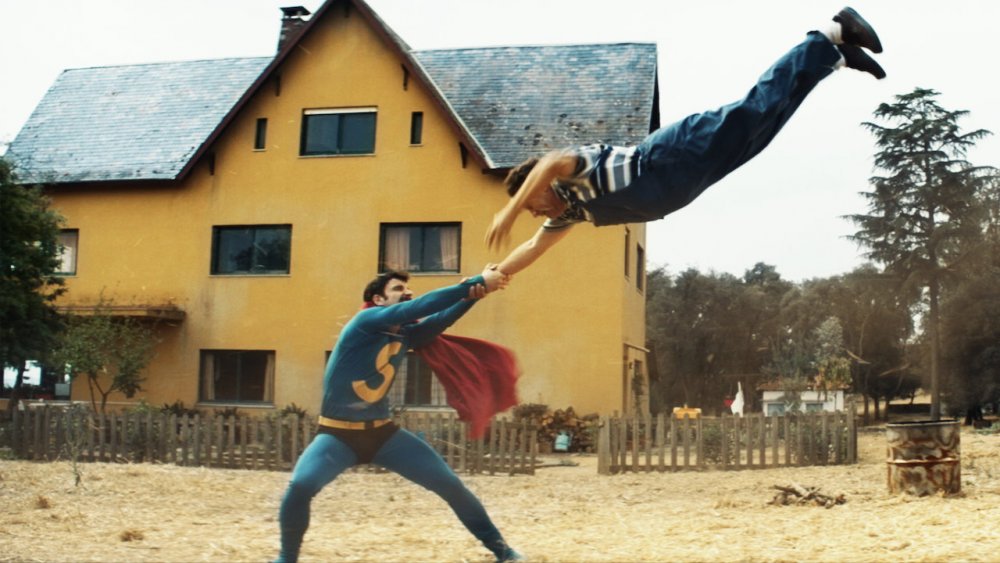Hidden Superhero Gems On Netflix You Need To Watch
This content was paid for by Netflix and created by Looper.
Not all heroes wear capes. Only some of them have superpowers. Most importantly, not all of them come from Marvel or DC. Sure, everyone loves the Justice League and the Avengers, but the big two don't have a monopoly on stories about people struggling to contain their fantastic powers, fighting dastardly villains, or taking to the streets to dispense some vigilante justice.
In fact, because "superhero" is more of a collection of tropes than a genre, a superhero story can be just about anything. You don't need spandex, or secret identities, or even superpowers to make a superhero movie. You just need a hero — or a few of them — who are willing to fight to make the world a better place. As a result, superheroes can star in slapstick comedies, noir thrillers, dystopian epics, kids' cartoons, documentaries, and everything in between.
These movies prove it. Sure, they might be a little off the beaten path, but that's what makes them so fun. After all, the big names already have conventional superhero adventures covered. These films don't have gigantic budgets and multi-million-dollar marketing campaigns, but don't be fooled. They're superhero movies through and through.
A Flying Jatt
If you're searching for a superhero flick that does something new, keep on looking. A Flying Jatt isn't it. The hero's origin story, which involves a stray bolt of lightning, borrows more than a little from the Flash. A super-speed action scene at an airport would've been creative and well-executed if we hadn't seen the exact same thing (but better) in X-Men: Days of Future Past.
But A Flying Jatt doesn't just stick to convention. It skewers it, too. As Aman Dhillon, a young man who's forced to spring into action when a wealthy developer tries to take his family's land, actor Tiger Shroff shows off the same charm and charisma that made him a star in Hindi movies like the romantic action flick Heropanti and the thriller Baaghi, and uses it to bring a new kind of superhero to life. Aman is afraid of everything — including heights, which is an ingenious twist given that Flying Jatt's whole gimmick is, well, flying — and his everyman-style befuddlement regarding the unique situation he's found himself in makes the film worth watching.
Director Remo D'Souza has some serious comedy chops, too, and the movie's requisite "new hero learns how his powers work" scenes are genuinely funny. A Flying Jatt isn't a great movie, but kids will certainly appreciate this lighthearted, low-stakes, comedic take on superheroics — and, chances are, adults will find a few things to smile at, too.
Bhavesh Joshi Superhero
What would a real-life superhero look like in this day and age? Well, for one, he wouldn't have any powers. He'd fight against street thugs and corrupt government officials, not cackling supervillains. He'd probably have a homemade costume. He'd definitely have a YouTube channel.
That's basically Bhavesh Joshi Superhero in a nutshell. In the movie, a trio of college students open a YouTube channel called Insaaf (Hindi for "justice") and film themselves wearing paper bags as they expose small-scale corruption. However, over time, the investigation escalates, and the trio end up in the crosshairs of a cabal that's controlling the local water supply. Things get worse from there, leading to the debut of the masked vigilante Insaaf-Man, who streams all of his exploits online.
Bhavesh Joshi Superhero isn't a comedy. Its fight scenes, while over the top, take themselves very seriously, and there's more than a little of Christopher Nolan's Dark Knight trilogy in Bhavesh Joshi Superhero's DNA. The movie could use a few cuts and its actors aren't always up to the material, but the thrilling action sequences (especially a motorcycle chase through the streets of Mumbai), the noir-ish tone, and the inventive premise make this a very welcome spin on traditional Hollywood superheroics.
Code 8
Stephen and Robbie Amell aren't new to the superhero game. The former starred as Oliver Queen (a.k.a. the Hood, a.k.a. the Arrow, a.k.a. the Green Arrow, a.k.a. the Spectre) for eight seasons on the CW's Arrow. His cousin Robbie appeared in a number of episodes of Arrow's sister show The Flash as Ronnie Raymond, one-half of the hero known as Firestorm, and had the lead role on the X-Men-like series The Tomorrow People.
Basically, the Amell boys know what they're doing. If you had any doubts, let Code 8 put them to rest. In Code 8, Robbie Amell stars as Conner, a PWP ("People with powers") with the ability to control electricity. In Code 8's world, the PWPs used to be a valued segment of society, but regular citizens eventually turned on the extraordinary minority, and superpowers are now banned. In order to get medical treatment for his ailing mother, Conner accepts a gig helping other PWPs rob banks, which is led by a man named Garrett (the other Amell). Naturally, complications ensue.
So yeah, it's X-Men with a crime movie twist. Like X-Men, Code 8's political commentary isn't particularly subtle (the PWPs are a very thinly veiled analogue for America's immigrant population), and like X-Men, it's full of pulpy soap operatics. That's what makes it so fun. Code 8 is clearly a passion project for the Amell cousins — they raised funds for the movie themselves via a $2.5 million Indiegogo campaign — and it shows. Can you blame them? Superheroing is in their blood.
Freaks
"Protecting a world that hates and fears them," the rallying cry for Marvel's X-Men, could also be used to describe a number of indie superhero movies. Count Freaks among them. Not that you'd know at first, though. If you want the real Freaks experience, stop reading this summary immediately. The less you know about Freaks, the better it is.
Still here? Well, okay. Your loss. While Freaks begins as paranoid supernatural thriller, it takes a major turn when a young girl named Chloe (Lexy Kolker) escapes the house she's spent her entire life in only to learn that she's telekinetic, that her grandfather can turn invisible, that her father can shift time, that her mother is being held captive in a government holding facility, and, oh yeah, all so-called "abnormals" are public enemy number one.
That should all seem pretty familiar to superhero fans, but again, it's how Freaks tells the story that makes it so unique. It's a mystery film, which wisely doles out information at a deliberate pace. You won't know exactly what's going on until the credits roll. Freaks doesn't pull any punches, either. Raised in almost complete isolation and cut off from everyone but her father, Chloe is running low on empathy. When she gets mad, you can understand why the government thinks abnormals are such a threat.
iBoy
A teen gets shot in the head by street thugs, wakes up with shrapnel from his broken smartphone stuck in his brain, and as a result gets tech-based superpowers. No, seriously, that's the setup for Adam Randall's iBoy, which is based on Kevin Brooks' YA novel of the same name (notably, the book was published 10 years ago, which explains a lot about the film's take on technology).
After his accident, young Tom (Bill Milner) has more abilities than you can imagine. Intercept phone signals? Hack into any device? Learn martial arts in an instant by downloading YouTube tutorials? If it's somehow related to gadgets, Tom can do it, and he won't stop until he brings down the gang that assaulted his friend.
So no, iBoy doesn't make a lot of sense. That's part of its charm. Taken at face value, iBoy is very, very silly. Approach it like a throwback to '90s techno thrillers like Hackers and The Net, which treated the tech with an air of befuddled reverence, and you'll have a much better time.
There's even an interesting (and possibly unintentional) comment on surveillance culture and vigilantism lurking behind iBoy's cheesy exterior, as Tom's invasion of others' privacy makes him increasingly unlikable as the movie goes on. In the absence of a relatable protagonist, it's up to Game of Thrones' Maisie Williams, who plays Tom's crush Lucy, to do a lot of the emotional heavy lifting. Naturally, she's up to the task.
Marvel & ESPN Films Present: 1 of 1: Genesis
Professional athletes and superheroes have a lot in common. They both possess remarkable physical abilities that regular people can only dream of. They're both role models. They both engage in epic clashes against rivals, and they both rely on heart, willpower, and their innate drive to succeed when the chips are down.
Marvel & ESPN Films Present: 1 of 1: Genesis takes this comparison to its logical extreme, drawing explicit connections between Marvel's superheroes and top-tier American sports stars. Now, keep in mind, Genesis is very much a corporate product. Disney owns both Marvel and ESPN, and as a documentary, Genesis doesn't always dive as deep as it could. It's more interested in pumping up both brands than turning a critical eye on either, and some of the parallels the documentary draws, like comparing Carmelo Anthony to Captain America, feel like a stretch.
Still, there's an interesting premise fueling Marvel & ESPN Films Present: 1 of 1: Genesis, and when the documentary takes a break from its own strained myth-building to really examine the cultural parallels between sports and comic book culture, it's good stuff. Genesis isn't the final word on this topic, but it's not a bad starting point. At the very least, it's a whole heck of a lot better than past efforts at similar material (Marvel's NFL SuperPro, anyone?).
Next Gen
Mai Su hates robots. Just hates them. That means she's pretty miserable in the world of Next Gen, where robots are everywhere, especially IQ Robotics' Q-Bots, which function as both assistants and mechanical companions. Things get even worse when Mai's mother drags her to IQ's latest product launch and accidentally activates 7723, a soldier-bot decked out with an arsenal of deadly weapons.
Mai's displeasure disappears, however, when she realizes that she can use 7723's weapons to take out the Q-Bots that have been tormenting her for good. Naturally, Mai and 7723 become friends, with the robot eventually deciding it would rather not be used as an instrument of violence — which becomes a problem a little later, when IQ's CEO reveals that the Q-Bots aren't quite as good-natured as they seem.
As you can tell, Next Gen has a lot in common with both Disney's Big Hero 6, which is based on a Marvel comic, and The Iron Giant, which is secretly the best Superman movie ever made. It also has bona fide comic roots: The joint American-Chinese production is based on Wang Nima's webcomic 7723, although the film and the comic don't look anything alike. Still, despite its obvious influences (Next Gen's directors even describe the movie's action scenes as "Marvel-like"), Next Gen stands on its own as a charming story about an unlikely friendship. It's for kids first and foremost, but if you like any of the movies that inspired Next Gen, you'll probably enjoy this one, too.
Psychokinesis
If you're a fan of genre movies, you've probably heard about Train to Busan, Yeon Sang-ho's critically acclaimed zombies-on-a-train thriller. Well, guess what? Psychokinesis, Yeon's first superhero movie, is just as good. Wondering how you missed it? Psychokinesis arrived on Netflix the very same day that Avengers: Infinity War hit theaters. For superhero fans, it wasn't really a choice.
Not that Psychokinesis and Infinity War have all that much in common, of course. Oh, sure, they're both superhero yarns, but while Infinity War is a gigantic spectacle paying off a decade's worth of storytelling, Psychokinesis is a small and intimate story. Its hero, Seok-heon, is a lowly security guard, not a tech-genius billionaire or Norse god. Its villain is a real estate developer, not a genocidal space tyrant. Infinity War's biggest emotional moment is the obliteration of half of all life in the universe. In Psychokinesis, a man is simply trying to reconcile with his long-lost daughter.
However, Psychokinesis' modest scope and a DIY vibe doesn't mean that it isn't a whole lot of fun. Early in the movie, Psychokinesis is downright hysterical, and its small scale gives the movie an intimacy that some of Marvel's big blockbusters lack. Psychokinesis is the perfect counterpoint for people who love superheroes but are sick of Hollywood-style bombast. It deserves better than getting lost in the shuffle.
Scott Pilgrim vs. the World
If a superhero had the powers of a video game character, they'd be a lot like Scott Pilgrim. Just look at what he can do. Fight like a Street Fighter character, including executing multi-hit combos and throwing a shoryuken? Check. Level up when he defeats enemies (or reaches important real-life milestones), becoming more powerful? Check. Get up again after losing a fight — and his life — by using a 1-up? Check again. In fact, while you could quibble that Scott isn't technically a superhero, he shares so many traits with his comic book peers, including a super-powered rogue's gallery, that the difference is negligible.
More importantly, Scott Pilgrim vs. the World is the most faithful adaptation of superhero comics' aesthetics ever seen onscreen. When movies like Sin City and Watchmen tried to ape specific comic book panels, it robbed the images of their power — what works well on a printed page doesn't always translate to live action. Scott Pilgrim takes a different approach. Instead of copying the source material, director Edgar Wright integrates comic book tropes like written sound effects and multi-panel layouts seamlessly into the movie. It's basically what movies like Dick Tracy and Ang Lee's Hulk tried to do years earlier, but executed much, much better.
Of course, it also helps that Scott Pilgrim vs. the World is a legitimately great movie that uses a fun concept — Scott must defeat his girlfriend Ramona Flowers' seven evil exes to have a shot at real happiness — to deliver a heartfelt story about life as a 20-something. It's funny, it's exciting, and it's surprisingly emotional. You can't really ask for more.
See You Yesterday
Years before Cable arrived from the future in Deadpool 2, or the Avengers traveled back into other Marvel movies in Avengers: Endgame, or the old-school X-Men teamed up with their younger counterparts in Days of Future Past, Superman was turning the world backwards in order to save his one true love, Lois Lane, and stop Lex Luthor's depraved real estate scheme. Time travel: It's a superhero cinema staple.
See You Yesterday, which comes from first-time director Stefon Bristol and producer Spike Lee, may not contain a single scrap of spandex (although its main characters' backpacks-and-goggles getups resemble low-rent superhero costumes), but it tackles the same themes: Can you use time travel as a way of fighting injustice? The big difference is that, in See You Yesterday, the stakes are deeply personal. Teen geniuses C. J. Walker and Sebastian Thomas, who invent the time travel devices, are black. They're not out to save the world. They just want to stop C. J.'s brother from dying in a police shooting.
Superhero stories have never been shy about their politics — X-Men is a not-so-subtle metaphor for the civil rights movement, the popular Civil War storyline has many parallels to America's gun control debate, and Captain America punched Hitler in the face on the cover of his very first comic — and See You Yesterday isn't either. It's a sci-fi take on the Black Lives Matter movement, and it raises interesting questions about the role race plays in both the real world and genre fiction. Just don't expect any answers: See You Yesterday's ending is intentionally ambiguous. Even with special abilities, some problems are simply too big to easily solve.
Superlopez
As fun as they are, superheroes are inherently silly. Grown men and women who dress in brightly colored, skin-tight costumes and beat each other up using their fists and a host of outrageous powers? Strip away the melodrama, and that's absolutely ridiculous. Not that we always take our superheroics seriously, of course. Movies like Deadpool, Mystery Men, The Incredibles, Teen Titans Go! To the Movies, Sky High, and plenty of others have mined superhero tropes for comedic material, often to great effect.
You can add Superlopez to the list, although it's worth noting that the Spanish superhero parody actually came before all of those. Superlopez is based on a long-running comic by a cartoonist who goes by Jan, which debuted way back in 1973. That's just a few years after Adam West's Batman skewered the Dark Knight on the airwaves, and less than two decades after "Superduperman" catapulted MAD Magazine into the mainstream (and drew the wrath of DC Comics' lawyers).
Like the comic it's based on, Superlopez is a straight-up Superman parody. His girlfriend, Luisa Lanas, is a riff on girl reporter Lois Lane, while Superlopez's birth name, Jo-Con-Él (which translates in Spanish to "Damn-with-him") is pretty obviously inspired by Superman's original name of Kal-El. Thankfully, most of the other jokes in Superlopez are a little better than that. Superlopez is a goofy little movie, but it's an affectionate parody, not a mean one. If you're a superhero fan who's looking for a quick laugh, add this to your queue.
